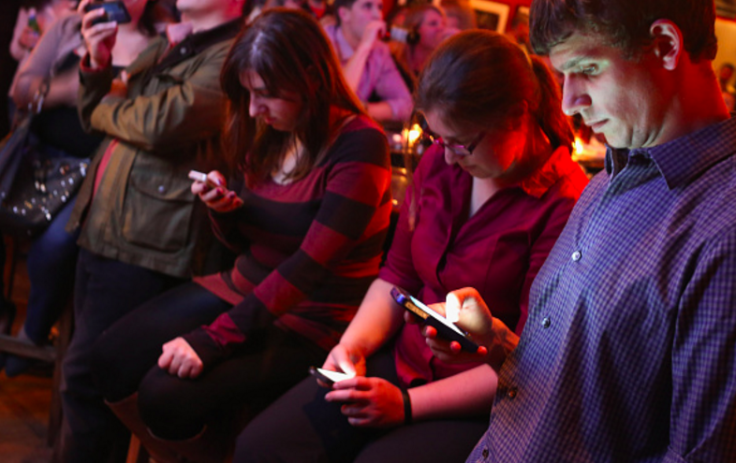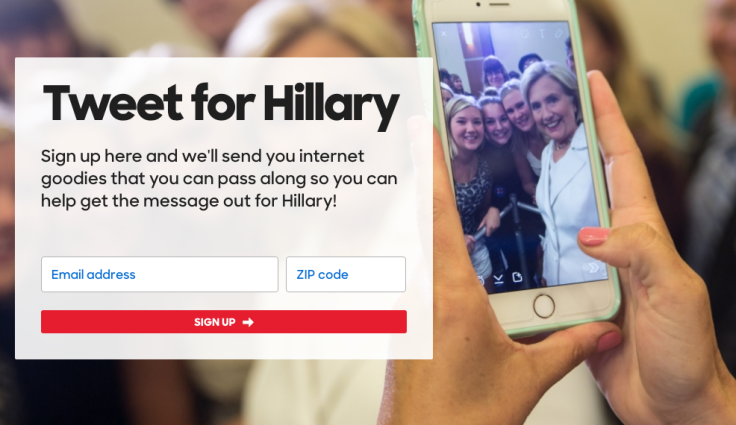Inside Twitter’s CBS News Debate Partnership: Political Spotlight May Finally Elevate TWTR User Numbers

Tweet for Hillary. #DebateWithBernie. Follow O’Malley. Twitter has entrenched itself in the 2016 presidential election, no big surprise to many candidates and political strategists. But the 9-year-old social network, thanks to a tie-up with CBS, will soon get the mainstream attention it has yet to achieve in campaign seasons.
Twitter inked a deal with CBS to integrate its services into the first presidential debate on broadcast TV, scheduled for Saturday at 9 p.m. EST at Drake University in Des Moines, Iowa. That prime-time opportunity follows Facebook’s partnership with Fox News for a Republican debate in August, which came after a 2012 deal with NBC and a 2008 partnership with ABC.
On Saturday night, about 20 Twitter employees will be on the ground in Iowa, in a war room with CBS workers. The staff will track the conversation on Twitter by monitoring the service's analytic systems. The producers of CBS on-air and CBSN, its 24/7 streaming news network, will receive the information in real-time and be able to present visualizations of the data on all channels.
These displays may include a line graph for each candidate's share of the online conversation. CBS can also show what issues are trending the most as well as pull in real-time, curated tweets about the debate. Moderator John Dickerson may also ask questions from Twitter users. "The CBS team and the Twitter team are working very closely. We’ve done dry runs using the tools. We’ve thought through different scenarios," said Christy Tanner, senior vice president and general manager of CBSNews Digital.
Using Twitter to inform news coverage isn't exactly new. “It’s probably safe to say that somebody on our social team or news team is using Twitter every second of every day," Tanner said.
For Twitter, the deal is a marketing boost that's very much needed. The company has been struggling with growing its user base. While Facebook boasted 1.55 billion monthly active users and $4.5 billion in revenue, in the last quarter, Twitter’s quarterly report in September showed $569 million in revenue and 320 million monthly active users.
This prime-time spot will put the little blue bird -- and the data behind it -- in front of millions of TV viewers and cord-cutters on CBSN. The partnership adds in an endorsement and grants Twitter an opportunity to tout its messaging and analytical capabilities like never before.
“Twitter may be the one who benefits more [than CBS] in an attempt to market among average voters, average viewers who are tuning in,” said Brian Donahue, a former Republican campaign manager and now head of digital ad agency CRAFT. “These are big opportunities for exposure. It’s not dissimilar to putting your name on the side of an arena.”
Twitter And Politics
Interest from Washington and politics came quickly to Twitter. Barack Obama joined in March 2007. At the time, the presidential contender was on YouTube, MySpace, Digg and Facebook as well. The 2008 race has even been referred to by some as the “Facebook election” due to Obama’s emphasis on the site for campaigning.
In September 2011, Twitter introduced political advertising. By that time, 80 percent of Congress was on Twitter.
We just made history. All of this happened because you gave your time, talent and passion. All of this happened because of you. Thanks
— Barack Obama (@BarackObama) November 5, 2008That interest and engagement from Washington has not faltered despite the fragmentation of social networks. “It’s important to get their supporters out there when a lot of people are paying attention to a hashtag,” said Colin Delany, political-tech consultant and the founder and editor of epolitics.com.
Each contender in the 2016 race boasts a Twitter account.
And the candidates, with their campaign teams, digital director and online consulting firms, have consistently used the microblogging site during campaign events and debates. “Our campaign uses Twitter regularly to get out Bernie's powerful message,” Kenneth Pennington, digital director for Bernie Sanders, wrote in an email.
Who’s Listening?
While campaigns like to get their message out on Twitter, it's questionable just how engaged Twitter’s active user base of 320 million people is and who in fact is listening. “Twitter is still very relevant for politics. The question is how is Twitter relevant among average voters and not just among political insiders,” Donahue said.
Twitter has been seen as a site more devoted to and engaged by power users -- that mainly includes celebrity accounts, journalists and brands -- than the average consumer. “You’re using it to target online influencers. People who are setting the agenda. People like journalists, bloggers and activists,” Delany said.
That’s no surprise to the company. Twitter’s executive team has acknowledged it hasn’t reached the “mass market,” as noted by Chief Financial Officer Anthony Noto on its earnings call in July. “The product remains too difficult to use. We have not communicated why people should use Twitter. This is both a product issue and a marketing issue,” Noto said.
Presidential candidates are helping to address that. Clinton has been asking her constituents to tweet for her, offered online seminars on how to use the website ahead of the last debate in October and will host one again on Saturday, Delany noted.

Sanders’ campaign has also built up its own Twitter army, which the digital director said will be used to spur engagement Saturday. “As Bernie delivers his message of economic and social justice on stage, our supporters and the campaign will be using Twitter off-stage as a powerful means for communicating his agenda,” Pennington wrote.
Clinton has 4.67 million followers, Sanders has 834,000 followers and O’Malley has 101,000. Clinton and Sanders share about 250,000 followers, according to Twitter analytics site SocialRank.
Twitter has ramped up its product and offerings since its founding in 2006, deepening its ties to politics. For instance, as of September, politicians now can collect campaign donations directly on Twitter via a partnership with mobile payments company Square.
But Twitter’s donation tool may not be drumming up the most support. Twitter and campaigns have yet to reveal the breakdown. According to ActBlue, the bulk of campaign donations are still solicited through email despite several new mobile offerings and tools. “People are looking to social media for entertainment -- a donation ask is just not going to be very entertaining,” said Laura Packard, a digital strategist for nonprofits and Democratic political campaigns. “On Twitter, there’s so much content all the time. Most people won’t see it.”
Turning On The TV
Twitter has been working to be seen, as Noto noted in July. The company released new tools for fall television shows in September. And it has begun to roll out an aggressive marketing campaign that included a TV ad, which first aired during the first game of the World Series.
As an official partner for Saturday’s debate, Twitter will again have the opportunity to attract prime-time viewers. “I think working with Twitter really goes to the core of our mission to public service, to help voters make the most informed decisions,” CBS's Tanner said.
As for the second screen experience, Twitter will most likely have a “Moment,” a curated feed of tweets, about the debate.
What would you ask the Democratic presidential candidates? Tweet using #DemDebate pic.twitter.com/i8y85GsWoC
— Twitter Government (@gov) November 12, 2015Twitter is also asking viewers to tweet a question that could be asked during the debate with the hashtag #DemDebate -- but no promises any actually will air. “We’ll be asking people for questions, and we’ll maybe ask those questions of the candidates,” CBS debate moderator John Dickerson told Stephen Colbert Thursday on the "Late Show." “If they’re really good we’ll use them or if not we’ll use them after.”
“For kindling?” Colbert joked.
Providing data and insight is a service from Twitter that isn't new to a newsroom. “It’s become a key tool in covering news for the industry, so it really does make sense that we would work with Twitter on this debate,” Tanner said.
© Copyright IBTimes 2024. All rights reserved.





















